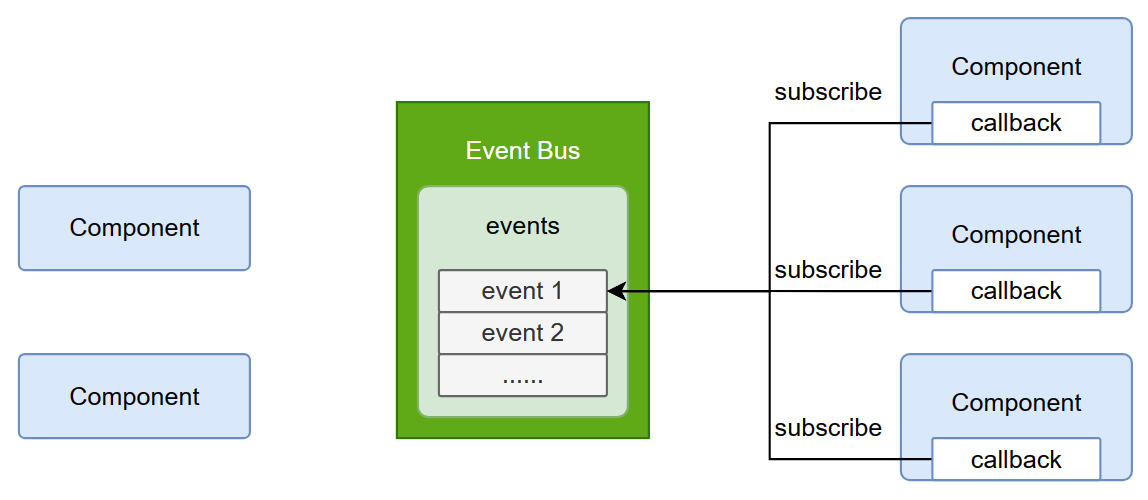[JS] 事件总线
事件总线与发布订阅模式
事件总线是对发布-订阅模式的一种实现。
发布-订阅模式定义对象间的一种一对多的依赖关系,当一个对象的状态发生改变时,所有依赖于它的对象都将得到通知。
发布-订阅模式实现了松耦合,发布者不是直接将消息发送给订阅者,而是经过了一个中间的代理,事件总线就是一种中间代理的实现。
事件总线维护了一个事件列表,订阅者可以订阅某一个事件,并指定一个回调(回调的具体实现在订阅者内部);
每个事件又维护了一个依赖列表,发布者可以“触发”一个事件,事件总线负责遍历该事件的依赖列表,调用每一个当初订阅者订阅时指定的回调函数。


在 JS 中实现Event Bus
定义一个EventBus类:
class EventBus{}
需要维护一个事件列表,在初始化事件总线对象的时候创建。
对于每一个事件,我们需要记录它的事件名(string类型),还需要记录该事件的依赖列表(Array<Function>类型),依赖列表其实就是各个订阅者的回调函数的列表。
这采用了一个对象来记录多个事件,刚好键值对就是事件名:依赖列表
constructor(){
this.eventObject = {};
}
实现订阅:
每一次订阅需要指定订阅的事件名和发布时要触发的回调函数。
- 如果指定的事件不存在,则添加一个事件,并推入该新依赖(回调函数)。
- 如果指定的事件存在,则直接推入新依赖(回调函数)
subscribe(eventName, callback){
if(!this.eventObject[eventName]){
this.eventObject[eventName] = [];
}
this.eventObject[eventName].push(callback);
}
实现发布:
发布也要考虑到指定的事件是否存在。如果不存在,则中断并返回警告;如果存在指定事件,则依次调用事件的依赖列表(回调列表)。
publish(eventName){
const callbackList = this.eventObject[eventName];
if(!callbackList)return console.warn(eventName + " Not Found!");
for(let callback of callbackList){
callback();
}
}
汇总如下:
class EventBus{
constructor(){
this.eventObject = {};
}
/**
* @param {string} eventName
*/
publish(eventName){
const callbackList = this.eventObject[eventName];
if(!callbackList)return console.warn(eventName + " Not Found!");
for(let callback of callbackList){
callback();
}
}
/**
* @param {string} eventName
* @param {Function} callback
*/
subscribe(eventName, callback){
if(!this.eventObject[eventName]){
this.eventObject[eventName] = [];
}
this.eventObject[eventName].push(callback);
}
}
优化Event Bus的实现
在发布时传递参数
使用...args介绍不定长参数列表,在发布时传入,并在调用回调函数列表的时候依次传入。
/**
* @param {string} eventName
*/
publish(eventName, ...args){
const callbackList = this.eventObject[eventName];
if(!callbackList)return console.warn(eventName + " Not Found!");
for(let callback of callbackList){
callback(...args);
}
}
提供取消订阅的操作
在订阅者调用subscribe方法订阅事件的时候,返回一个用于取消订阅的unSubscribe方法。
在实现事件的回调函数列表的时候,需要为每一个回调函数添加一个id,方便以后查询并删除该回调函数。
这里将订阅的回调函数列表换成用对象结构存储,因为在数组中删除某个中间元素较麻烦且耗时,效率不如对象结构的delete删除键值对。
换成对象结构存储后,键值对表示:id:回调函数。
class EventBus{
constructor(){
// 初始化事件列表
this.eventObject = {};
// 回调函数列表的 id
this.callbackId = 0;
}
/**
* @param {string} eventName
*/
publish(eventName, ...args){
// 取出该事件的回调函数列表(对象)
const callbackObject = this.eventObject[eventName];
if(!callbackObject)return console.warn(eventName + " Not Found!");
// 执行每一个回调函数,这里的id是对象的key
for(let id in callbackObject){
callbackObject[id](...args);
}
}
/**
* @param {string} eventName
* @param {Function} callback
* @returns {{
* unSubscribe: Function
* }}
*/
subscribe(eventName, callback){
if(!this.eventObject[eventName]){
this.eventObject[eventName] = {};
}
// 为当前事务的回调函数申请一个专属id
const id = this.callbackId++;
// 绑定回调函数
this.eventObject[eventName][id] = callback;
// 生成取消订阅的函数
const unSubscribe = ()=>{
// 删除该回调函数
delete this.eventObject[eventName][id];
// 如果该事件的回调函数都删完了,则顺便删除事件列表中的事件
if(Object.keys(this.eventObject[eventName]).length === 0){
delete this.eventObject[eventName];
}
}
return {unSubscribe};
}
}
清除某个事件
/**
* @description 清除某事件
* @param {string} eventName
*/
clear(eventName){
if(!this.eventObject.hasOwnProperty(eventName)){
return console.warn(eventName + " Not Found!");
}
delete this.eventObject[eventName];
}